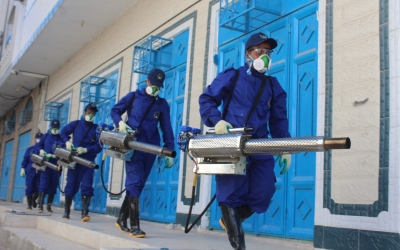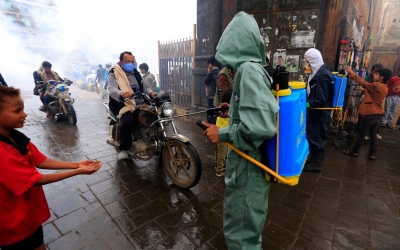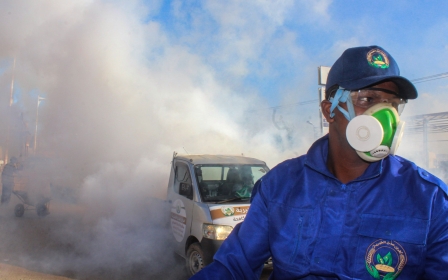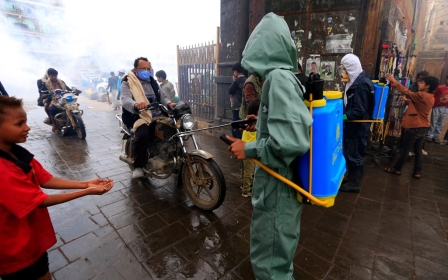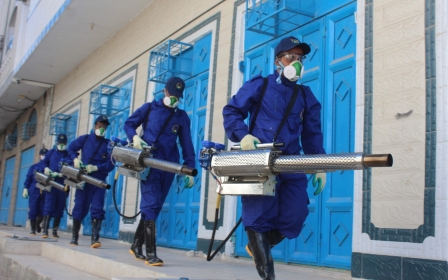Coronavirus: Yemen's crowded quarantine sites are hotbed for pandemic

As soon as the coronavirus started to spread in pro-government areas of Yemen, which are mostly in the southern provinces, the rebel Houthis began converting schools on the borders between the two sides into quarantine sites.
The Houthis sent any travellers from the infected provinces to the quarantine sites, where the inmates were instructed to stay for 14 days before being allowed to enter Houthi-controlled areas.
Those forced to stay at the sites have told Middle East Eye they were not properly prepared to receive the travellers and that conditions in the converted schools are terrible.
Moreover, inmates are free to leave the sites to shop at local markets and many have escaped within hours of arriving.
“It is not a quarantine site, but it is a school where hundreds of people stay in classrooms and tents and there are no basic services,” Ridhwan, a driver with a transport company, told MEE.
Ridhwan was travelling from Aden, in the government-controlled south, to Sanaa at the end of April, when he was stopped at a Houthi checkpoint in Al-Beidha’s Thi Naem district.
The Houthis ordered Ridwhan and the other passengers in his car to go into quarantine.
“Many passengers travel from Aden to Sanaa through other roads with smugglers, but my company did not allow me to go through the smugglers’ road so I fell into the hands of the Houthis,” said Ridwhan.
Yemen's internationally recognised government declared Aden, where it is temporarily based, an “infested city” on 11 May, after experiencing dozens of deaths on a daily basis.
The declaration was made due to the spread of Covid-19 and other diseases, including dengue, malaria and chikungunya, after recent flooding.
The first confirmed Covid-19 case was announced in Yemen on 10 April. Until now, there have been 184 confirmed cases, 180 of which have been in pro-government areas, and 30 deaths.
'Shocked to see people chewing qat'
Ridhwan was told that there were organisations supervising the quarantine sites and that they were good places to stay in for 14 days, but the complete opposite turned out to be true.
“I’m not against quarantine but I’m against the sites and the supervisors of the sites, which are good places for the coronavirus to spread,” he told MEE.
“When we entered the site I was shocked to see people chewing qat in a tent, as if they were at a wedding.”
'It is ridiculous and there was no real quarantine, rather we were in a prison where prisoners can’t receive any basic services'
- Ridhwan, Yemeni driver
Ridhwan had no choice but to sit and chew qat with the other men in the tent, and was then told by a supervisor that he would be staying in a tent with four other people, as there was no space for his own tent.
Women were housed in classrooms where there were more than five females along with their children sleeping in the same room.
“If there is one case infected by the coronavirus, it will easily spread among all the people in the school,” said Ridhwan.
At 8pm, the supervisors of the site provided the inmates with dinner, and Ridwhan was again shocked when he saw that everyone ate their food in groups.
“I preferred not to eat anything as I didn’t trust that the food was clean," said Ridwhan. "Then I went to the toilets and there was neither water nor soap.”
'There was no real quarantine'
Ridhwan asked some of the inmates who had been their awhile about the source of the water and they told him that he could leave his ID card with the guards and go to buy anything he wanted from the market, which he did.
“It is ridiculous and there was no real quarantine, rather we were in a prison where prisoners can’t receive any basic services,” said Ridwhan.
The sounds of supervisors shouting at inmates amid the crying of children dominate the site, while most of the men go to the market in the morning and then chew qat from noon until night.
After three days, Ridhwan persuaded the supervisors of the site to allow him to sleep in his car beside the school.
“I didn’t sleep well for three nights and then I saw some inmates sleep in their cars and I was lucky to get permission," said Ridhwan.
“I still don’t know what the purpose of such quarantine is, which threatens the inmates as it is easy for the coronavirus to spread.
"I hope the authorities in Sanaa and organisations send an investigation team to see the conditions in those sites.”
Escaping quarantine
Many inmates escape quarantine within just a few hours of entering the sites, and there are many people who enter the Houthi-controlled areas without being quarantined.
Nabil, 39, was travelling from Aden to Sanaa on 14 May when he was stopped at a Houthi checkpoint in Ibb province and sent to a quarantine site in the Al-Qaeda area.
'Only people who don’t know a Houthi person, or people who respect the authorities, stay at quarantine sites'
- Nabil, 39
“I couldn’t resist at the checkpoint, but when I arrived at the school I found it to be unorganised and immediately called a Houthi friend in Ibb to help me get out,” Nabil told MEE.
Nabil’s friend arrived at the site within two hours and Nabil escaped with other inmates who were with him in the same car.
“Only people who don’t know a Houthi person, or people who respect the authorities, stay at quarantine sites, but many escape from quarantine,” said Nabil.
Most people leaving the pro-government areas travel with smugglers who go through safe roads where the Houthis do not have quarantine sites or at least do not send all passengers to quarantine.
“No one is willing to go to into quarantine, so hundreds of smugglers transport passengers from Aden to Sanaa in buses and cars,” one such traveller, Abdulellah, told MEE.
“I travelled with a smuggler last week and we went through a long road but it was safe.”
Abbdulellah said that he was against travelling with smugglers but his family is in Sanaa and his work is in Aden, so he wanted to enjoy the Eid holiday with his family in the capital.
“Before Eid, many people travel among the provinces, and if all of them go to into quarantine the authorities will not find places to put them all, so we see the majority travel with smugglers,” he said.
Advice ignored
Apart from sending travellers from infected into quarantine, authorities in Sanaa have taken several precautionary measures against the coronavirus, including shutting down schools and universities, and closing shopping centres and supermarkets from 6pm to 6am.
Authorities in the capital have advised people to stay at home and not leave unless there was a dire need.
Despite advice not to travel between provinces, movement between areas has remained almost the same.
A source in Sanaa's health ministry, who wished to remain anonymous, confirmed to MEE that the quarantine sites for travellers had not been properly prepared, stating that their main purpose had been to stop the movement between provinces.
“There are some good quarantine sites in Sanaa and other provinces, and they are either hospitals or hotels, but we are only using them for suspected cases,” he said.
“The purpose of the quarantine sites on the borders between provinces are to reduce movement between the provinces as such movements helps in transferring Covid-19 among the provinces.”
The source said they knew many people were travelling with smugglers to Houthi areas, indicating that people did not respect the advice of the authorities.
“Unfortunately, people have not adhered to the instructions from the health ministry and they keep travelling as normal, so I hope authorities can impose new restrictions on the smugglers,” he said.
Middle East Eye delivers independent and unrivalled coverage and analysis of the Middle East, North Africa and beyond. To learn more about republishing this content and the associated fees, please fill out this form. More about MEE can be found here.



